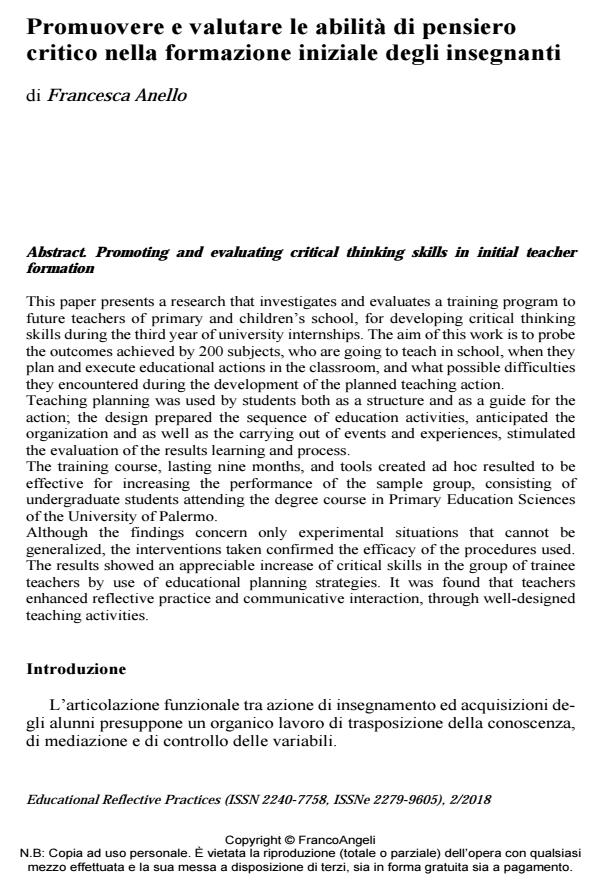Promuovere e valutare le abilità di pensiero critico nella formazione iniziale degli insegnanti
Titolo Rivista EDUCATIONAL REFLECTIVE PRACTICES
Autori/Curatori Francesca Anello
Anno di pubblicazione 2019 Fascicolo 2018/2
Lingua Italiano Numero pagine 17 P. 35-51 Dimensione file 181 KB
DOI 10.3280/ERP2018-002003
Il DOI è il codice a barre della proprietà intellettuale: per saperne di più
clicca qui
Qui sotto puoi vedere in anteprima la prima pagina di questo articolo.
Se questo articolo ti interessa, lo puoi acquistare (e scaricare in formato pdf) seguendo le facili indicazioni per acquistare il download credit. Acquista Download Credits per scaricare questo Articolo in formato PDF

FrancoAngeli è membro della Publishers International Linking Association, Inc (PILA), associazione indipendente e non profit per facilitare (attraverso i servizi tecnologici implementati da CrossRef.org) l’accesso degli studiosi ai contenuti digitali nelle pubblicazioni professionali e scientifiche.
This paper presents a research that investigates and evaluates a training program to future teachers of primary and children’s school, for developing critical thinking skills during the third year of university internships. The aim of this work is to probe the outcomes achieved by 200 subjects, who are going to teach in school, when they plan and execute educational actions in the classroom, and what possi-ble difficulties they encountered during the development of the planned teaching action. Teaching planning was used by students both as a structure and as a guide for the action; the design prepared the sequence of education activities, anticipated the organization and as well as the carrying out of events and experiences, stimulated the evaluation of the results learning and process. The training course, lasting nine months, and tools created ad hoc resulted to be effective for increasing the performance of the sample group, consisting of under-graduate students attending the degree course in Primary Education Sciences of the University of Palermo. Although the findings concern only experimental situations that cannot be general-ized, the interventions taken confirmed the efficacy of the procedures used. The results showed an appreciable increase of critical skills in the group of trainee teachers by use of educational planning strategies. It was found that teachers en-hanced reflective practice and communicative interaction, through well-designed teaching activities.
Francesca Anello, Promuovere e valutare le abilità di pensiero critico nella formazione iniziale degli insegnanti in "EDUCATIONAL REFLECTIVE PRACTICES" 2/2018, pp 35-51, DOI: 10.3280/ERP2018-002003